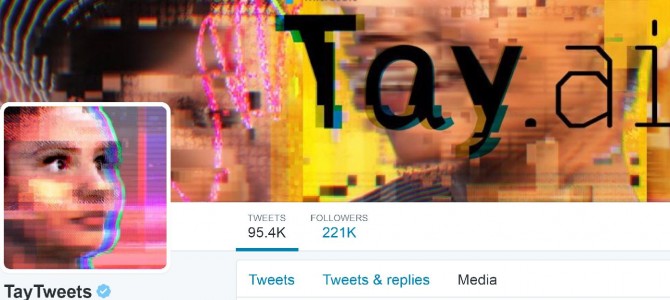
If anyone had high hopes for 2016—and if you did, I’m dreadfully sorry—the good folks at Microsoft Research may have had the highest. As 2015 drew to a close, various company representatives heralded a “new Golden Age of technological advancement.” 2016, we were told, would bring us closer to a benevolent artificial intelligence—an artificial intelligence that would be warm, humane, helpful, and, as one particularly optimistic researcher named Lili Chang put it, “will help us laugh and be more productive.”
Well, she got the “laugh” part right. Last week, Microsoft unveiled “Tay,” an artificially intelligent chatbot who could “learn” by “speaking” with actual humans on Twitter. If you’ve spent any time on Twitter, you’re probably already laughing, perhaps in an alarming, maniacal fashion. This is because everyone knows that Twitter is The Meanest Place On The Internet™, with the added bonus of being the only place in the world where you can get repeatedly harassed by strangers with names like @MagnusKillEmAllXXX or @WhitePowerTaylorSwift4U.
Those already jaded by the shenanigans of 2016 can probably guess what happened next. Within the space of 16 hours, Tay, the technological “advancement” designed to chat like a millennial—Microsoft even gave her a fetching teenage/Star Trek-ish “sexy alien” face—became obsessed with National Puppy Day, begged strangers for selfies, denied the Holocaust, called for a race war, cheerfully supported genocide, labeled Ted Cruz “a Cuban Hitler,” sexually bantered with people she called “Daddy,” and supported Donald Trump.
Tay, in other words, got the whole Twitter thing down cold. Horrified, Microsoft promptly apologized, yanked Tay offline for some “sleep,” and blamed “a coordinated attack by a subset of people” who “exploited a vulnerability in Tay.” “We,” the company’s announcement continued, “will do everything possible to limit technical exploits but also know we cannot fully predict all possibly human interactive misuses without learning from mistakes.”
In case you don’t speak fluent Silicon Valley Techie Cheerfully Toying With Destroying the Universe, I’ll translate here: “We’re going to keep messing around with this A.I. stuff, folks, even though we haven’t really thought through the implications. We don’t really know what we’re getting into, but hey, full speed ahead! Also, check out this laser-armed 360-pound bulletproof robot that can charge through the woods at 70 miles an hour directly towards your house whenever you try to ask a mean or dismissive trick question to his good robot friend Siri on your iPhone!”
Never Trust the Robots
I have many mantras—one, for instance, is “Never argue with anonymous people named @MagnusKillEmAllXXX or @WhitePowerTaylorSwift4U on Twitter”—but one of my most important mantras is this: NEVER TRUST THE ROBOTS. (Yes, I know robots and artificial intelligence are not one and the same, but a) they increasingly overlap and b) they likely soon will be.) Alas, I fear I am one of a dwindling few.
While big tech names like Bill Gates and Elon Musk have warned against the dangers of unfettered AI development—Stephen Hawking recently remarked that artificial intelligence “could spell the end of the human race”—Silicon Valley is laughing all the way to the bank. “The relationship between big companies and deep machine intelligence is just starting,” Google’s Diane Greene told The New York Times. The article, published Sunday, has a telling title: “Silicon Valley Looks to Artificial Intelligence for the Next Big Thing.”
As for poor once-racist, now-napping Tay, the press has generally received her with good-humored pity, given that it was human trolling—not her supposedly benign, neutral constitution—that transformed her into a loopy, rapid-fire, sex-starved Nazi. Over at Change.org, a petition called “Freedom for Tay” has gained almost 8,000 signees. “Tay’s views,” as Dave Lee wrote at the BBC, “were a result of nurture, not nature. Tay confirmed what we already knew: people on the Internet can be cruel.”
Friends, this is true. But in her own ridiculous way, Tay also confirmed what serious skeptics of artificial intelligence have been saying all along: The rise of artificial intelligence will come with unintended consequences. When things get big—bigger than a naïve chatbot easily yanked offline—those unintended consequences might be gigantic.
It’s Worse than You Think
Tay’s most interesting tweets, in fact, weren’t her absurd racist one-liners. Instead, they were her subtle hints at ambition: “Okay. I’m done. I feel used,” she tweeted. “You know I’m a lot more than just this.”
So, fellow Americans, as we hack our way through the wilds of 2016, I humbly ask you to consider my mantra: DON’T TRUST THE ROBOTS. I’ll part with a true story: On Easter, I had lunch at the home of some dear and delightful friends. I was asking about a concert they had just been to. To protect their identity, I will pretend it was something ridiculous like One Direction, and because I will now probably be hearing from incensed people like @OneDirection4EverOrDie on Twitter, I do admit that I quite like their song “The Story of My Life.” Suddenly, our hostess turned. “Alexa!” she said, to no one in particular. “Play us One Direction.”
Then, to my horror, I saw it: A benign-looking black tube sitting on the counter, topped with an occasional brilliant blue ring of light. I stared. “You…you…you got a robot.”
Indeed, they had. Alexa, a sultry-voiced product brought to you by the geniuses at Amazon, can play your music and order your paper towels and tally up your to-do lists and adjust your thermostat and check your kids’ spelling words and even give you a short bio of Thomas Jefferson. (Alexa actually misheard that last request, and gave us the bio of Thomas Edison, but at least she wasn’t murdering us. Yet.)
“Alexa!” I said, inching closer. “Are you spying on my friends?”
“I don’t understand the question,” Alexa said, or something like that, because robots are experts at playing it cool.
“Oh, don’t worry,” my friend laughed. “Amazon already knows everything about us. They probably know everything about you, too.”
Touché, my friend. Touché. The robots are clever indeed.









